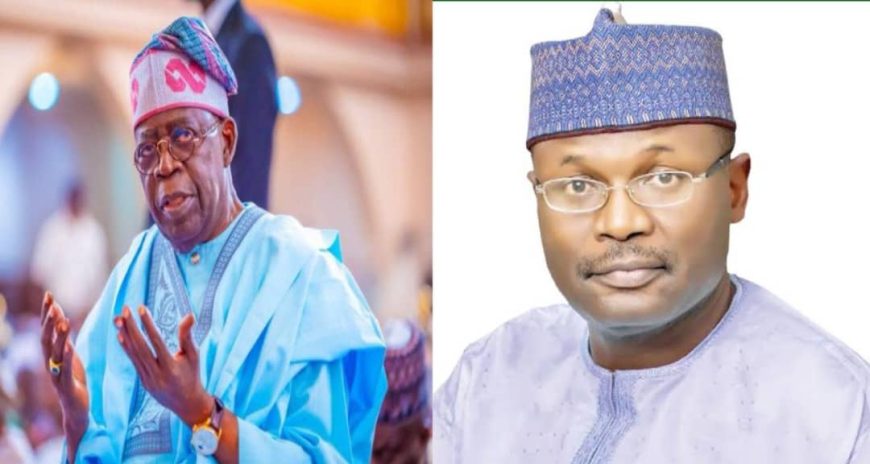Tinubu Dismisses INEC Chairman Prof. Mahmood Yakubu Amid Electoral Reform Push
President Bola Ahmed Tinubu has sacked the Chairman of the Independent National Electoral Commission (INEC), Prof. Mahmood Yakubu, in a move widely seen as part of his administration’s drive for electoral reforms. Yakubu, who led INEC since 2015 and oversaw two general elections, faced growing criticism over credibility and transparency issues, particularly during the 2023 polls. While civil society groups and opposition parties have reacted cautiously, analysts say the decision signals Tinubu’s determination to restore public confidence in Nigeria’s electoral process. An acting chairman is expected to be announced soon as consultations for a permanent successor continue.

In a dramatic political development, President Bola Ahmed Tinubu has dismissed the Chairman of the Independent National Electoral Commission (INEC), Prof. Mahmood Yakubu, from office. The move, which came as a surprise to many Nigerians, was confirmed late Thursday evening by officials of the Presidency.
Prof. Yakubu, who has served as INEC Chairman since November 2015, was Nigeria’s longest-serving electoral umpire, having overseen both the 2019 and 2023 general elections as well as numerous off-cycle gubernatorial polls. His tenure has been one of the most eventful in the country’s electoral history, marked by both commendations and widespread criticisms.
Background to the Sack
Sources close to the Presidency revealed that the decision to relieve Prof. Yakubu of his duties was influenced by mounting pressure from civil society organizations, opposition parties, and even factions within the ruling All Progressives Congress (APC). Many stakeholders have questioned the credibility of elections under his leadership, particularly the 2023 presidential elections, which were marred by allegations of irregularities, technical glitches, and controversies surrounding the results transmission system.
President Tinubu, who came into office with a strong pledge to reform Nigeria’s electoral system and restore citizens’ trust in democratic institutions, reportedly viewed the shake-up as a necessary step toward rebuilding confidence in INEC.
Tinubu’s Reform Agenda
Since assuming office, President Tinubu has consistently emphasized accountability, transparency, and reforms in governance. His administration has already embarked on wide-ranging changes in key government institutions, including the security sector, the economy, and now the electoral body.
The dismissal of the INEC Chairman is seen by analysts as part of a broader strategy to strengthen the credibility of Nigeria’s democratic process ahead of the 2027 general elections. “The President wants an electoral body that can guarantee free, fair, and credible polls without excuses,” a senior government official disclosed.
Reactions from Stakeholders
- Civil Society Groups: Several pro-democracy organizations have welcomed the sack, describing it as long overdue. “Prof. Yakubu lost the confidence of Nigerians during the last general elections. His removal is a positive step toward reform,” said the Transition Monitoring Group (TMG).
- Opposition Parties: The Peoples Democratic Party (PDP) and Labour Party (LP) have also reacted cautiously, with spokespersons stating that while the move may be justified, they are concerned about who will succeed Yakubu and whether the next appointee will be truly independent.
- Ruling Party (APC): Within the APC, opinions appear divided. While some members praise Tinubu’s boldness, others fear the decision could set a precedent that undermines the autonomy of INEC.
- General Public: On social media, Nigerians are expressing mixed feelings. Some see the move as a bold reform, while others worry that it may be politically motivated.
Profile of Prof. Mahmood Yakubu
Born in Bauchi State in 1962, Prof. Yakubu is an academic and historian who made his mark as a professor of political history and international studies. Before his appointment as INEC Chairman, he served as the Executive Secretary of the Tertiary Education Trust Fund (TETFund).
His eight-year tenure at INEC was historic in many ways, introducing innovations such as the Bimodal Voter Accreditation System (BVAS) and the INEC Result Viewing Portal (IReV). However, his leadership also drew criticism over logistical challenges, delayed polls, and allegations of compromised electoral integrity.
Next Steps
The Presidency is expected to announce an acting INEC Chairman in the coming days to ensure that the Commission continues to function smoothly. Names of potential successors are already being speculated, with sources hinting at a shortlist of senior commissioners within INEC and respected academics with electoral experience.
Political observers believe the appointment of Yakubu’s replacement will be one of the most consequential decisions of Tinubu’s presidency. The credibility of future elections, especially the off-cycle governorship elections scheduled for 2026, will depend heavily on the leadership of the Commission.





![Judikay-Man-of-Galilee-[penovas.com].mp3](https://penovas.com/uploads/images/202509/image_430x256_68cc803d1d1d6.png)







































